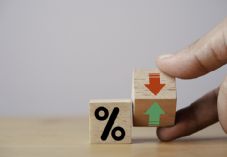UK DIY News
Inflation dropped to a record low in February

UK inflation rate fell to 0% in February, the lowest since records began, official figures show.
Lower prices for food and computer goods helped to cut the rate from 0.3% in January, official figures show.
February's figure is the lowest rate of Consumer Prices Index (CPI) inflation since estimates of the measure began in 1988.
The drop in the CPI measure was sharper than many analysts had expected, with most expecting a rate of 0.1%.
The February figure means that the cost of living is the same as it was a year earlier.
Deflation expectation
Ben Brettell, senior economist at Hargreaves Lansdown, said UK "took another step towards deflation" in February.
"It looks likely the rate will drop below zero at some point in the coming months, and hover around zero for most of the year," he said.
Analysis: Robert Peston, BBC economics editor
"For now at least, the fall in the price of food, games, petrol and energy, if it persists for a few months, is good news for most of us - because it increases our spending power and our pounds go further.
In other words we feel and are a bit richer.
But if stagnation in prices were to go on for longer, if it were to turn into fully fledged deflation, that would be worrying.
The point is that if we thought that the price of things we don't normally have to buy at any particular moment - household goods like washing machines for example, or motor cars - was on a firmly downward path, we would probably defer purchases of those things, and that would depress economic activity."
Deflation is unlikely to be prolonged, in part due to pressure from rising oil prices, said CBI director of economics Rain Newton-Smith
Low inflation could support UK economic growth, business lobby group the British Chambers of Commerce (BCC) said.
"We remain convinced that there is very little risk of a long period of deflation," said David Kern, BCC chief economist.
"Inflation in the service sector, which accounts for 80% of the UK economy, remains firmly above the government's 2% target, and core CPI inflation in February was 1.2%.
"Together with higher earnings, lower inflation is boosting people's spending power, and will contribute to economic growth in the year ahead," he said.
Rain Newton-Smith, director of economics at business lobby group the CBI, said: "Despite inflation dropping to zero, it is unlikely we will see falling prices for a prolonged period, particularly as the pressure from lower oil prices fades."
However, she added: "With the Monetary Policy Committee still alert to the risk of very low inflation becoming entrenched, a rise in interest rates anytime soon seems off the cards."
Last week, the Bank of England's chief economist Andy Haldane said rates were as likely to need cutting as raising in the immediate future.
Cheaper energy
In February, the Bank said that inflation could turn negative temporarily in the spring because of falling oil prices.
Cuts in energy bills are among the factors likely to push inflation lower in March, according to economists.
But unlike in the eurozone, where prices are already showing annual falls, many economists think UK consumer demand will remain steady in the face of falling prices, due to robust employment growth and signs of a pick-up in wages.
Falling prices for food, laptops, tablets and computer peripherals contributed to the fall in February's CPI measure, the Office for National Statistics (ONS) said.
The ONS figures also showed the rate of Retail Prices Index (RPI) inflation fell to 1% from 1.1%.
Political pitches
Chancellor George Osborne told reporters that zero inflation was "good news for families", and that voters faced a choice in the general election on 7 May.
"Frozen prices are a first for the British economy. This zero inflation is driven by falling petrol prices and falling food prices, so it's good news for families," he said.
"Now the country faces a choice - do we go on working through a long-term plan that's delivering low prices and record jobs, or do we have the economic incompetence and chaos of the Labour party, whose economic argument has literally come to naught?" he added.
However, Labour said inflation is falling around the world "because global oil prices have plummeted, yet in Britain wages continue to be sluggish."
"Working people are £1,600 a year worse off under this government. And another Tory VAT rise if David Cameron wins the election will hit living standards and send prices rising again," said Cathy Jamieson, Labour's shadow Treasury minister.
"A few months of falling world oil prices won't solve the deep-seated problems in our economy. We need Labour's better plan to build a more productive economy so we can earn our way to sustained rises in living standards and so get the deficit down too."
Liberal Democrat Chief Secretary to the Treasury Danny Alexander said: "Coming alongside good growth and record numbers of jobs, Liberal Democrats in government are delivering a stronger economy and a fairer society."
"It's yet another month that sees earnings pulling ahead of prices, which will be a great help to millions of families."
Source : BBC News
www.bbc.co.uk/news/business-32031473
Insight DIY is the only source of market information that I need and they always have the latest news before anyone else.











































